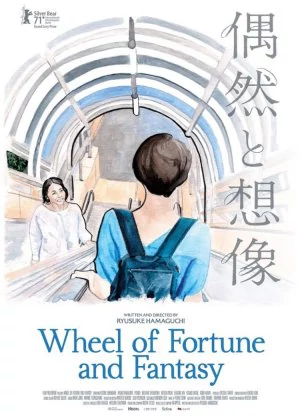Wheel of Fortune and Fantasy

2021 was a tough year for the movie industry, but that didn't stop some directors from making the best of it. Ryusuke Hamaguchi had a pretty grand year, with no less than two films showing up in respected end of year lists. Drive My Car is no doubt his most talked about film, but Wheel of Fortune and Fantasy [Guzen to Sozo] clearly had an impact too. Since it is the shorter of the two (and I'm also not the biggest Hamaguchi fan), I figured I'd give that one a go first. And I must admit, I was pleasantly surprised by this somewhat peculiar anthology project.
![screen capture of Wheel of Fortune and Fantasy [Guzen to Sozo]](/thumbs/img/articles/1200xauto/wheel-fortune-fantasy-1.webp)
While I love a good anthology film, I tend to prefer the ones that offer a wider selection of directors and directorial styles (which is why many of the anime ones are so great). Wheel of Fortune and Fantasy does exactly the opposite. Hamaguchi serves up three unrelated short films, but the style and approach of each film are pretty much carbon copies. It creates a more cohesive whole, which is what most people seem to prefer, but it does go against the potential of the format. That said, if the quality of each short is consistently high, there's not that much to complain about, and so I did end up loving this film.
Normally, I would review each short by itself, I just don't think that would make a lot of sense here. It's not just that Hamaguchi's style remains a constant throughout, the actual setup of each film is also extremely similar. They all deal with a candid conversation between two or three people, where truths are spoken in the most polite manner possible, the way only Japanese people can manage. It's exactly that contrast and tension that seems to bind these stories together, and which no doubt landed them together in this anthology.
Though the shorts focus heavily on characters and conversations, they all feature a pretty specific narrative setup that allows for interesting dynamics between the characters. The first short sports two girls who discuss one girl's steamy date the night before, only to realize the man they are talking about was the former boyfriend of the other girl. The second short sees a woman trying to trap a college professor as a favor to her boyfriend, while the final short features two women who randomly meet each other on the street and recognize each other from their college years.
![screen capture of Wheel of Fortune and Fantasy [Guzen to Sozo]](/thumbs/img/articles/1200xauto/wheel-fortune-fantasy-2.webp)
The cinematography is pretty bare bones. I understand Hamaguchi wants us to focus on the dialogues and actors, but I don't agree a bit of extra polish would've taken away from that. There are some decent shots and some very nice long takes, but the framing feels a little sloppy, the same goes for lighting and the use of color. It's not a particularly bad-looking film, it just feels somewhat underdeveloped and neglected. Hamaguchi already proved with Asako that he is capable of doing better, so I was a little disappointed to see him take a step backwards.
The soundtrack was also clearly an afterthought. There's a pretty basic but somewhat heavy-handed piano theme that helps with the transitions of the shorts, but that's about it. I think something lighter (and string-based) would've gone over a lot better, but the music is only featured for such short sequences that it didn't bother me too much. I didn't really miss the score during the other parts of the film either, though its absence does add to the stylistic void that kept this film from making an even bigger impact on me. People who prefer character-based films probably won't care as much.
A lot of the weight rests on the shoulders of the actors, and they sure didn't disappoint. Their behavior is quite typically Japanese, so some familiarity with Japanese drama is definitely welcome. I'm a real sucker for their candidness and eagerness to speak the truth, only delivered in such a way that it sounds as respectful and demure as possible. There are no weak links in the cast and each actor brings something unique to the table, but Kotone Furukawa and Kiyohiko Shibukawa are the real stand-outs for me. I wasn't really surprised by Shibukawa's performance, Furukawa is a real discovery.
![screen capture of Wheel of Fortune and Fantasy [Guzen to Sozo]](/thumbs/img/articles/1200xauto/wheel-fortune-fantasy-3.webp)
I'm usually all about experience and atmosphere, not about dialogue and characters, but there are always exceptions to the rule. That doesn't mean I think this film's perfect. There are little twists and turns in the plots of each short that felt kind of unnecessary (like the entire sci-fi angle in the third one, which doesn't add anything), the cinematography and soundtrack are a bit too basic and the first two shorts didn't feel quite finished. But the core of the film is extremely solid and for a minimalist setup that spans a 2-hour runtime, it never felt slow, forced or boring.
Wheel of Fortune and Fantasy deserves the praise it has been getting, and it made me a bit more excited to watch Drive My Car. It's not the most stylistic or polished film, but Hamaguchi's focus lies elsewhere. A superb cast, intriguing characters and electrifying conversations paint a picture of likeable, 3-dimensional people who find themselves in somewhat awkward situations. It's a film that is likely to go over well with fans of more traditional arthouse cinema, but should also be able to appeal to a broader audience, as long as you're not expecting a lot of physical action.